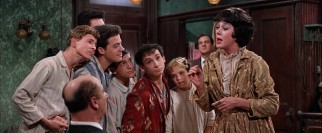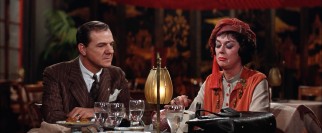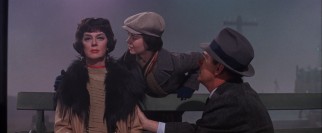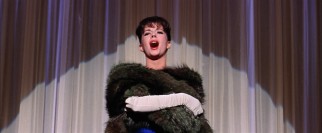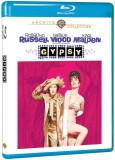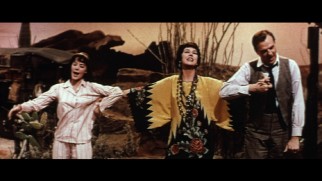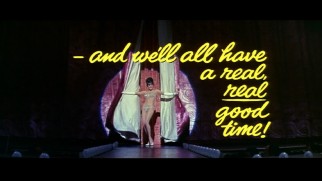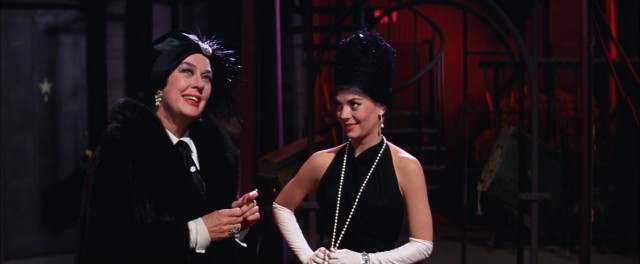Gypsy Blu-ray Review
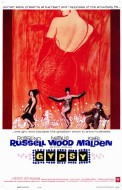 |
Gypsy
Theatrical Release: November 1, 1962 / Running Time: 143 Minutes / Rating: Not Rated Director: Mervyn LeRoy / Writers: Leonard Spigelgass (screenplay), Arthur Laurents (book of musical play), Gypsy Rose Lee (memoirs) Cast: Rosalind Russell (Rose Hovick), Natalie Wood (Louise Hovick/Gypsy Rose Lee), Karl Malden (Herbie Sommers), Paul Wallace (Tulsa), Betty Bruce (Tessie Tura), Parley Baer (Mr. Kringlelein), Harry Shannon (Grandpa), Morgan Brittany (Baby June), Ann Jillian (Dainty June), Diane Pace (Baby Louise), Faith Dane (Mazeppa), Roxanne Arlen (Electra), Jean Willes (Betty Cratchitt), George Petrie (George), Ben Lessy (Mervyn Goldstone), Guy Raymond (Pastey), Louis Quinn (Cigar) Songs: "Small World", "Some People", "Baby June and Her Newsboys", "Mr. Goldstone, I Love You", "Little Lamb", "You'll Never Get Away from Me", "Dainty June and Her Farmboys", "If Mama Was Married", "All I Need Is the Girl", "Everything's Coming Up Roses", "You Gotta Have a Gimmick", "Small World (reprise)", "Let Me Entertain You", "Rose's Turn" |
Buy Gypsy from Amazon.com: Blu-ray • DVD • Natalie Wood DVD Collection • Instant Video
The 1960s were the movie musical's last full decade of dominance. Dominate, it did. Musicals -- some original, most adapted from the stage -- repeatedly topped the box office and claimed cinema's highest honors: West Side Story, My Fair Lady, Mary Poppins, The Sound of Music, Adapted from the Tony-nominated 1959 Broadway musical, which itself sprung from the 1957 memoir of Gypsy Rose Lee, the film Gypsy opened in theaters in November 1962. There were enough movie musicals that year for the Golden Globes to have separate Comedy and Musical Best Picture categories. They did have to stretch a little to fill the musical category with five nominees, including Elvis Presley's Girls! Girls! Girls! and the circus-saving flop Jumbo. Gypsy's inclusion in the category may be the film's biggest honor, though it's easy to imagine it cracking the Academy Awards' Best Picture if the field allowed for as many films as it does today.
Gypsy Rose Lee's story is kind of racy and cautionary, but it's told in such a traditional Broadway fashion that it's tough to even notice that. Louise Hovick (Natalie Wood) is raised in show business by her overbearing stage mother Rose (Rosalind Russell). Wielding more gumption than talent, Rose is determined to have her daughter June be the star of a musical comedy Vaudeville act. The curly blonde moppet goes by "Baby June" (Suzanne Cupito, more recently known as Morgan Brittany) and then "Dainty June" (Ann Jillian). She is surrounded by young hopeful actors given meager lodging but no pay. Louise is also part of the supporting cast, wearing the head of a cow costume.
Catering to Rose's plans is Herbie Sommers (Karl Malden), an entertainer, candy vendor, and manager with a little more business sense. The thrice-divorced Rose won't marry Herbie and he won't stand up to her. So Rose's pipe dreams of her daughter's stardom continue to run on fumes as the Great Depression diminishes the demand for such entertainment. Rose turns down the one legitimate offer her daughter gets too, when Rose will not be included in the deal. At 13, Dainty June, too old for the cute kid routine, runs off and gets married to one of her fellow performers.
Then and only then does Rose consider her elder daughter's star potential. Louise is definitely too old to fill Dainty June's shoes, but Rose is as stingy with creativity as she is with money. Her biggest compromise is to let the brunette Louise keep her natural hair color and have her talentless back-ups become "Hollywood blondes." The cow remains in the act, though it's called a bull.
Louise and the blondes become a secondary act at a burlesque theater, which opens the young woman's eyes to the world of stripping. That isn't seen as a fitting line of work for a lady such as her, but adopting the name Gypsy Rose Lee, Louise succeeds at it. The success comes with a fracture in her questionable relationship with her mother.
Gypsy is old-fashioned entertainment, dated by 1962 and now barely resembling a modern film. It is a clear product of the theatre, Despite the title, the film squarely belongs to Rosalind Russell, an actress familiar with flamboyant characters. Gypsy would land Russell a fifth Golden Globe Best Actress nomination and like the other four, it would result in a win. Assuming the role famously originated on stage by Ethel Merman (who supposedly was angered to have been overlooked for the film), Russell was cast for her personality, not her singing voice. For the most part, Russell is dubbed by a contralto named Lisa Kirk. Wood, on the other hand, who herself had just been dubbed the year before on West Side Story, gets to do her own singing here. With music by Jule Styne and lyrics by Stephen Sondheim, the songs of Gypsy do a decent job of advancing the story and fleshing out characters. You are likely to recognize at least one or two of the numbers, even if you're not already familiar with this musical. Interestingly, the movie sees fit to include a plainly superfluous number by an unimportant character but loses one of the play's most widely covered tunes ("Together, Wherever We Go"), seemingly to spare audiences of Malden's average singing voice.
Jaunting along with little thought going to the psychological damage of Rose's parenting, Gypsy is enjoyable enough. The bold lead characters get ample opportunity to define themselves in speech and song, creating what is necessary to move us through the reasonable conflict and developments. Though she could be, Rose isn't completely vilified. The unorthodox rearing of stolen silverware, all-hours Chinese food, and pet monkeys and lambs is portrayed as eccentric, not unfit, as everyone around her complies with her whims in a hope to help her realize her dreams.
Twelve and a half years after its DVD debut (which has since been repackaged and discontinued), Gypsy recently hit Blu-ray via the Warner Archive Collection's first high definition wave.
VIDEO and AUDIO Gypsy's Blu-ray boasts splendid picture. The 2.40:1 transfer is everything you'd expect of a BD released to general retail. It boasts beautiful colors and clean, sharp visuals. Warner Archive's DVDs often treated niche films and television to modest picture quality, with disclaimers. Between this and the concurrent Deathtrap, though, it is clear that the studio's manufactured on demand Blu-rays will be higher profile films treated to higher caliber picture. In the sound department, there is disappointment in the fact that Gypsy is presented exclusively in a 2.0 DTS-HD master audio soundtrack. That wouldn't be an issue if the film's 2000 DVD hadn't presented it in Dolby Digital 5.1 sound and if the film's 70mm theatrical engagements hadn't presented it in six track stereo. While I know that some older movie remixes don't use surround channels for more than just slight reinforcement, it stands to reason that the lesser compression is undermined by the reduction in channels. The audio is a bit flat and inconsistent in quality. Unlike Warner Archive DVDs, English SDH subtitles are kindly provided here.
BONUS FEATURES, MENUS, PACKAGING and DESIGN Whereas Warner Archive DVDs typically arrive sans bonus features,
Two outtake musical numbers show us Karl Malden singing, something the filmmakers apparently didn't think audiences wanted. Malden, Russell, and Wood perform the oft-covered "Together, Wherever We Go" (2:39) out in the desert. Then, an extended version of "You'll Never Get Away from Me" (3:37) presents it as a duet between Malden and Russell, who evidently isn't dubbed in these. The other extra is Gypsy's original theatrical trailer (3:36). Like the one on Deathtrap, this one has a curiously abrupt opening. All three of those supplements are encoded in high definition resolution, but look like average -- and in the case of the deleted numbers, well below average -- SD video. That leaves just one bonus feature from the DVD missing here: on-screen production notes, something that Warner and other studios haven't provided in ages. The menu makes use of poster art previously used as DVD cover art. No scene selection section is offered, but the movie is divided into 43 somewhat willy-nilly chapter stops. Frustratingly, the disc does not support bookmarks or resuming playback. It's in Warner's interest to beef up their BD authoring ASAP.
CLOSING THOUGHTS Gypsy holds your attention as light musical entertainment faithfully adapted from the stage. That this is based on real life adds interest to material that is otherwise kind of standard and forgettable. Warner Archive's Blu-ray provides great picture and underwhelming stereo sound, while retaining the main bonus features of interest. An upgrade over the DVD and though a 5.1 soundtrack would make it a stronger one, this still gives the movie an HD release on the order of what it would have gotten in general retail. Buy Gypsy from Amazon.com: Blu-ray / DVD • Natalie Wood Collection • Instant Video
|
Related Reviews:
DVDizzy.com | DVD and Blu-ray Reviews | New and Upcoming DVD & Blu-ray Schedule | Upcoming Cover Art | Search This Site
DVDizzy.com Top Stories:
New to Blu-ray: Deathtrap • Lawrence of Arabia • A Special Sesame Street Christmas • Sparkle • Butter
Songs by Stephen Sondheim: Sweeney Todd: The Demon Barber of Fleet Street • Dick Tracy
Karl Malden: Pollyanna • The Adventures of Bullwhip Griffin
Musicals: A Star Is Born • Annie • White Christmas • Newsies • Evita • Chicago • Rock of Ages
1960s: The Sound of Music • Mary Poppins • The Happiest Millionaire • The Apartment
Blaze • Eloise at Christmastime • The Hunchback of Notre Dame • Esther Williams, Volume 1
Text copyright 2012 DVDizzy.com. Images copyright 1962 Warner Bros. Pictures and 2012 Warner Home Video.
Unauthorized reproduction prohibited.
